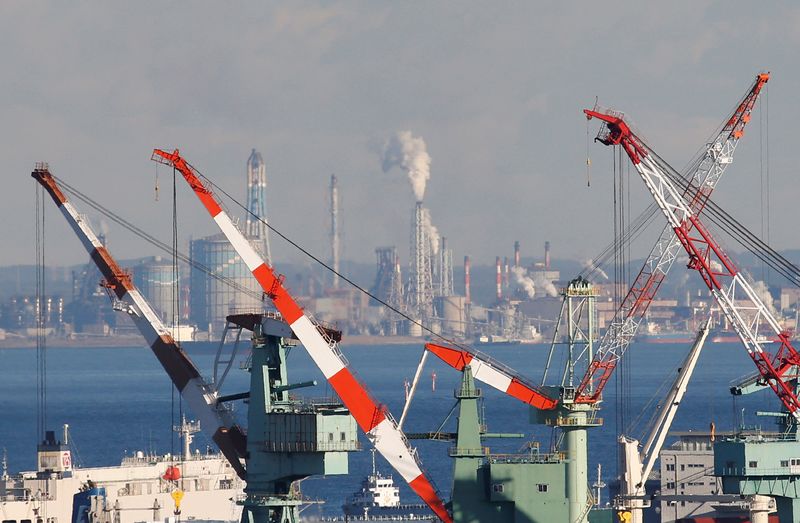Japan Dec factory activity contracts at fastest pace in 26 months
2022.12.15 21:25
[ad_1]

© Reuters. FILE PHOTO: Chimneys and cranes are seen at an industrial area in Yokohama, Japan, January 16, 2017. Picture taken January 16, 2017. REUTERS/Kim Kyung-Hoon
TOKYO (Reuters) – Japan’s manufacturing activity shrank at the fastest pace in more than two years in December on soft demand and persistent cost pressures, a corporate survey showed on Friday.
While service-sector output rebounded on a tourism reopening, weak factory activity has blurred Japan’s recovery prospects as companies enter labour talks, in which wage hikes are deemed essential for post-pandemic economic growth.
The au Jibun Bank Flash Japan Manufacturing Purchasing Managers’ Index (PMI) was down to a seasonally adjusted 48.8 in December from a final reading of 49.0 in the previous month.
The index was below the 50-mark that separates contraction from expansion for a second month and marked the sharpest decline since October 2020’s 48.7.
“Manufacturing firms continued to struggle in the face of subdued demand conditions and severe inflationary pressures,” said economist Laura Denman at S&P Global (NYSE:) Market Intelligence, which compiles the survey.
Output and new orders extended their contraction for a sixth month in December, although at slower paces than last month. Input price inflation rate slowed for a third month to the lowest pace since September 2021.
Meanwhile, service-sector activity grew on a tourism reopening, with the sub-index gauging its demand from overseas rising to the highest since September 2019.
The au Jibun Bank flash services PMI rose to a seasonally adjusted 51.7 in December, from the previous month’s 50.3 final, the survey showed.
With subdued manufacturers and robust services, the au Jibun Bank Flash Japan composite PMI stood on the break-even line of 50.0, up from a final 48.9 last month.
“The divergence between the manufacturing and services sectors has grown further,” said Denman, citing the government’s discount program for domestic tourists as an additional positive factor for the service-sector firms.
The growing disparity was also evident in the Bank of Japan’s latest business survey released on Wednesday, which found manufacturers’ mood soured for a fourth consecutive quarter while service firms’ sentiment hit its highest since late 2019.
[ad_2]
Source link








